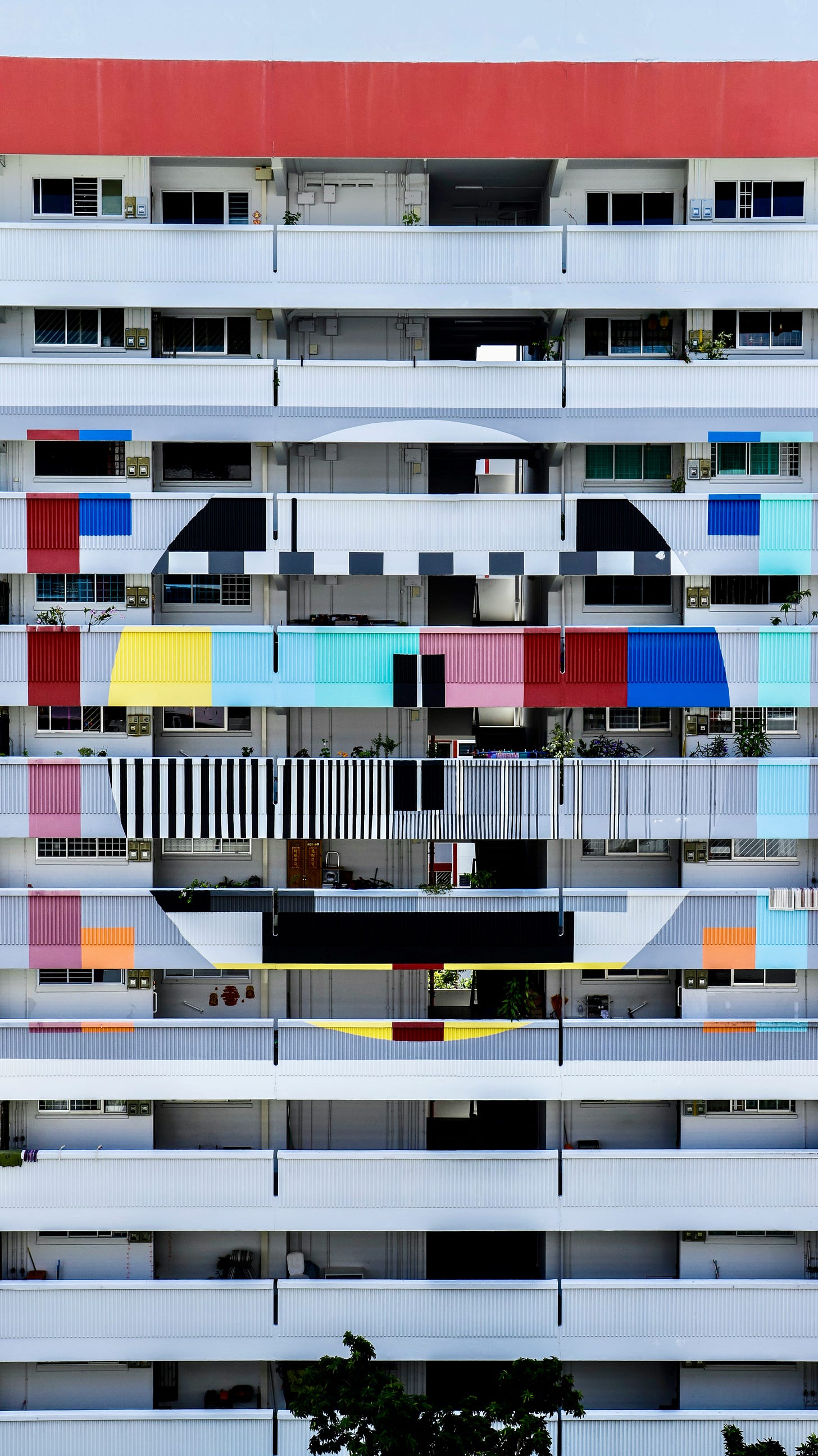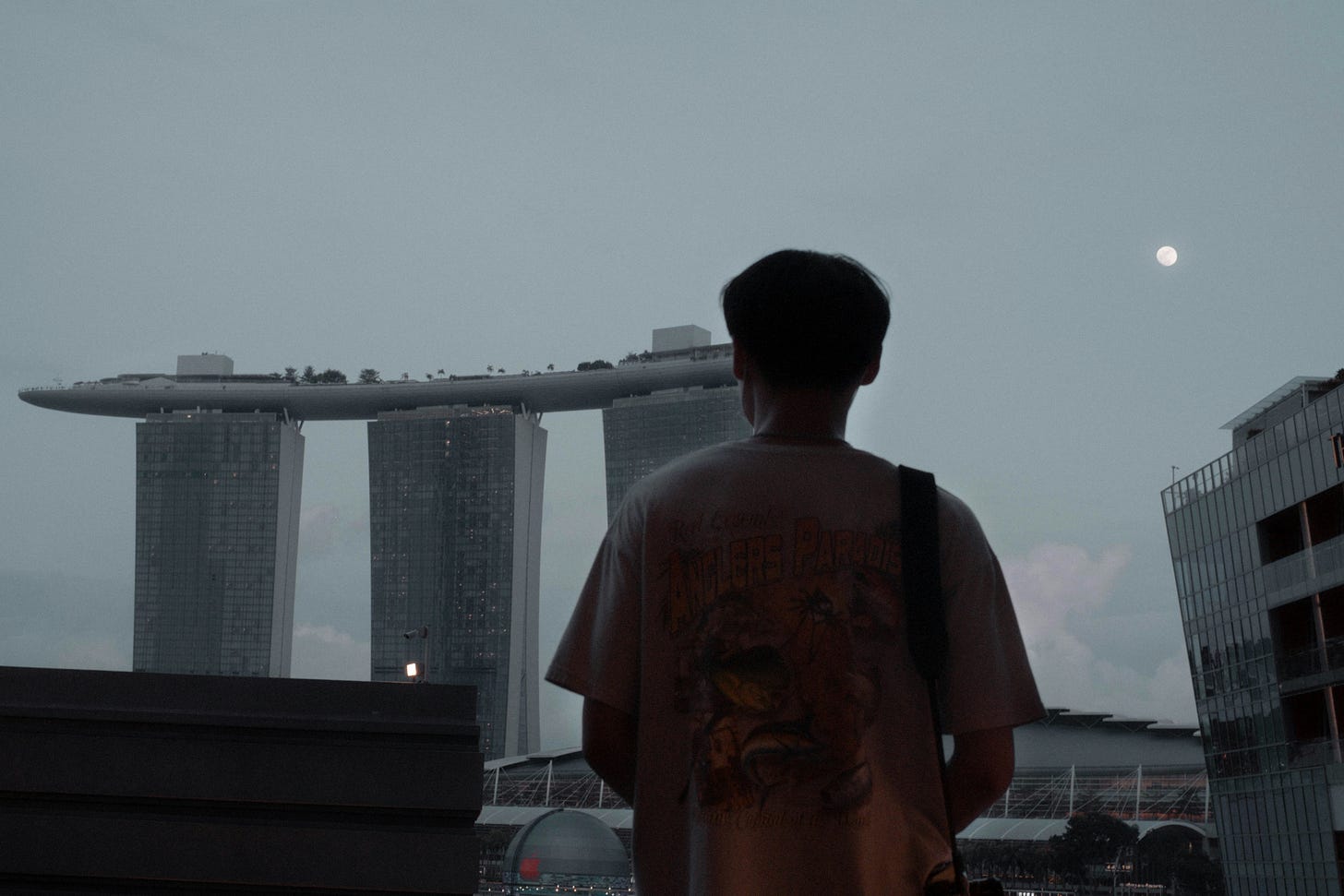🗣️ Our Voices, Our Votes: Josh 🗳️
“We talk a lot about multiple pathways to success, but nothing really changes. It’s still the same system, just with different packaging.” - Josh, he/him, 34-44
As we get closer to GE2025, I have been thinking a lot about whose hopes, worries, and dreams we hold and whose we leave behind. Our Voices, Our Votes is my small attempt to make more space for LGBTQIA+ Singaporeans to share what is on their minds. This is an invitation to slow down, to listen a little more carefully to different lived experiences, and to stay open hearted to what we might learn along the way.
For this interview, I got to sit down with Josh: someone who’s been quietly contributing to the success of future Singapore as an educator, while also navigating the messiness of queer life in Singapore.
Our conversation was honest and unpolished in the best way. He spoke from the heart about how the pressure on students has changed, what’s still not working in our education system, and the gaps that queer people still fall through when it comes to housing, support and visibility, everyday.
Josh isn’t someone who usually shouts about his passionate views, but when he speaks, there’s thoughtfulness and care. This chat reminded me that we need to hold space for voices like his who can’t be front and centre, but are still doing the work, still paying attention, still holding out hope.
Josh (he/him), gay, 34-44
Q: How are you feeling about the upcoming elections? Is it something on your radar, or have you been keeping your distance from it all?
A: I’ve tried to follow politics a bit more closely since the last elections. So yes, I’m paying attention to this one. Partly due to moving to a new area, even though it's not a hotly contested ward. Still, it's a new place for me, and I’m also curious to see how the new Prime Minister will perform during this election.
I’d say I’m actually quite excited to see what the results will look like.
Q: That’s interesting. Are you more excited about the lead-up to the election, like the campaigning and rallies, or is it really the final results that you’re looking forward to?
A: I think I’m quite excited about how Singaporeans and the different political parties will mobilise. I’m especially looking forward to seeing who their key candidates are and how they try to secure their place in Parliament.
Q: Did anything shift in your thinking after filling in the survey? Did it prompt any deeper reflections?
A: Yeah, I would say it did make me reflect a bit more about where I stand and who I am as a voter. Maybe not in a huge way, but definitely to some extent. Especially the last two questions you asked in the survey; they got me thinking.

Q: You noted that cost of living, housing access, and healthcare are the top three issues on your mind. Could you share more about why those stood out for you?
A: Sure. Let’s start with the cost of living. I think it's about money, really.
Over the past few years, especially after I came back from working in Hong Kong, I’ve noticed a sharp increase in how much things cost. Even going out to restaurants, some of them here are actually more expensive than in Hong Kong, and to me that just feels off, because Singapore used to be more affordable.
And I’ve heard the same from friends who visit from overseas. Even tourists can feel the price hike.
I still feel like I have some spending power for now, but I don’t know how long that will last.
That’s what makes me concerned.
And honestly, the cost of living affects everyone, whether you’re married or single, young or old—it cuts across all groups.
Q: That makes a lot of sense. And what about healthcare? What’s been on your mind there?
A: I mean, I’m healthy now, but I do hear stories. Like if someone gets a serious illness, it’s not always clear whether schemes like Medisave will be enough.
So even though we have a pretty comprehensive healthcare system with good hospitals, there are still long waiting times at clinics, and these little gaps that worry me.
It’s something I do think about from time to time.
Q: And then there’s housing. Would you say that’s more personal for you?
A: Yeah, housing feels personal. I bought my own place, so it’s really about managing the loan. But I do carry some frustration because I’m single. That means I could only buy a resale flat, and I didn’t get any government grants—unlike some of my friends who are married. So it feels like the system doesn’t really support people like me.
Even my sister just got a BTO, but the location is really far out. She’s single too, and it just makes me feel like we’re being pushed to the margins.
I understand the national interest in prioritising families and encouraging people to start families, but I still think that kind of approach puts singles at a disadvantage.
I’ll probably have to take a closer look at the policies again, but that’s where I’m coming from right now.
NB: Singapore's housing policies have prioritized families and marrying / married heterosexual couples. Changes have been slow to support singles. Since August 2024, first-time single applicants aged 35 and above can qualify for the Enhanced CPF Housing Grant (EHG) of up to $60,000 when purchasing a new or resale flat. However, frustration arises when singles are priced out of the area they want because of overwhelming high demand. - HDB, Stacked Homes, 99.co
Q: Earlier in our chat, you clearly expressed a sense that LGBTQIA+ issues won't be raised this election. What’s behind that feeling?
A: Honestly, it’s because I just don’t see the interest from politicians.
I get the sense that most of them don’t really care about us.
We’re a minority, and they have other issues they’re prioritising.
So in their eyes, we’re not urgent.
Also, it’s a very sensitive issue. If any of them speak up, they risk being seen as taking sides. And once that happens, they’re bound to face backlash no matter what position they take.
Especially during a campaign season, I doubt anyone wants to open that door.
That’s why I really don’t think it’ll come up.
NB: In the general elections in 2020, the LGBTQIA+ community have been calling out parties and candidates for their silence on issues. Additionally, in a JOM’s voter sentiment survey published in 2024, only 13% chose that LGBTQIA+ issues are pressing matters for them. A whopping 76.9 percent cited cost of living, and 53 percent also said housing. - Reuters, Yahoo News Singapore, JOM
Q: Even if it's unlikely to be talked about, do you still hope for it to be meaningfully addressed one day?
A: Of course I do. I mean, we are still part of this country.
If just one of them could raise something about the future of our community, that would mean a lot. It doesn’t even need to be huge.
Just something. Anything that shows they see us.
Q: We touched on manifestos earlier. Have you been reading up on different parties’ positions to help guide your decision this time?
A: Yeah, I did have a look. I think it was from a citizens’ site where it contained all the manifestos from the Parties contesting this year? I can’t remember all the names, but I’ve definitely been clicking around and reading a bit.
Q: And what about engagements with the candidates? Have you had any personal interactions with candidates or asked any questions?
A: So I’m staying in a single-member ward.
The opposition candidate previously announced was from the PAR. And when that was happening, I actually followed the candidate on Instagram and asked a question in the comments. I said something like, "How are you planning to run in this SMC?"
But the reply I got wasn’t even from him—it was someone else managing the account. They just said he’s formerly from another party. It didn’t tell me anything.
That says a lot. To me, if you're serious about running, you should at least show up properly and be clear about your intentions.
Since then, someone independent and new has stepped in to contest in the SMC. I’m looking forward to that.

Q: In the survey answers, you shared that Singapore feels stuck when it comes to the future of LGBTQIA+ rights. What’s been sitting with you that makes you feel that way?
A: I think it comes back to what I said earlier—it's just not a priority for them (the ruling party / the government). And it’s also such a difficult topic to raise in public.
A lot of people don’t have the guts to talk about it, especially in politics. So I don’t think we’ll see much movement for a while. That’s how I feel.
Q: When you look at what’s happening in places like Thailand and Taiwan, where there’s been progress, do you think there’s any room for hope here in Singapore too?
A: I really want to be hopeful. But it feels quite different here.
Thailand is mostly Buddhist and that gives it a different kind of openness. Over here, with the mix of religions—like Christianity and Islam—it’s harder. They tend to hold more conservative views.
So we’re still a long way behind in that sense.
Q: So the big question: what does a better future look like for you as an LGBTQIA+ person living in Singapore? What came to mind for you?
A: I spent some time thinking about that.
I think we just want to be seen.
Every election, when candidates introduce themselves, they talk about their kids or their families. And I always feel like... I can’t relate to any of that. So yeah, it’d be great to have some representation from people like us.
Right now, most people don’t know much about LGBTQIA+ folks because no one talks about us. Mainstream media rarely shows us. So we end up feeling invisible.
But if more people start coming out or being seen, it changes things.
People realise their friend is gay, or their child is queer—and that we’re just normal people. Nice people. There’s nothing wrong with us.

Q: That desire to be seen in ordinary, everyday ways feels really powerful. Do you think part of the problem is how the media still portrays queer stories?
A: Yes, that’s exactly it. I get quite upset when I see LGBTQIA+ lives always being lumped into the arts scene or presented as something niche or alternative.
Why can’t there be shows that just portray us living regular lives?
I want people to see what it’s like to be an ordinary LGBTQIA+ person in Singapore, without making it seem like some kind of big deal.
NB: Singapore’s Ministry of Communications and Information have repeatedly said that, even after the repeal of Section 377A, LGBTQIA+ content, and any form of positive portrayals, still warrant higher age ratings. In a statement, the Ministry reaffirmed the Government's position that the repeal of Section 377A of the Penal Code does not mean that the tone of society will be changed. - The Straits Times
Q: If a candidate were to speak up about any of this during the elections, would you feel more represented?
A: Definitely. That would mean a lot. At least it shows they’re not afraid.
Q: You’re not the first person who’s said it takes guts to speak up. It’s come up a few times in these conversations.
A: Yeah, I noticed that too. A lot of us end up saying the same thing. Politicians just don’t have the courage. Or maybe they do, but they’re not willing to take that risk. That’s what makes it feel like nothing’s going to change.
Q: Let’s wrap up on a fun note. If one day you found yourself elected into office, whether as an MP, NMP or in any parliamentary seat, what would be the very first thing you’d champion or change?
A: I think the first thing I’d do is push for real change in our education system.
The pressure on students today is worse than it was ten years ago. There’s a lot of talk about multiple pathways to success and embracing different talents, but to me it still feels like just talk.
I don’t see any real game changers on the ground. It’s still the same grind - for students, for educators, for parents.
With the rise of AI and how fast everything is changing, we need a serious rethink of what education should be preparing us for.
Not just better grades, but better lives.
Q: That sounds like something deeply close to your heart, especially given your work in education. Is there also something you’d want to change as a queer person living in Singapore?
A: Yes, absolutely. I really hope for more flexibility when it comes to policies that affect us as queer adults, especially around housing.
Many of us will eventually take on caregiving roles in our families, and yet the system often doesn’t reflect our lived realities.
It would mean a lot if policies allowed us to stay with our parents or support them without jumping through hoops. More flexible grants would help too.
Right now, so much is built around the assumption that we are going to start traditional families. But not everyone will have children or get married in the ways the system expects.
That needs to shift.
As we wrapped up, I kept sitting with this quiet tension in Josh’s story.
Here’s someone shaping young minds with so much heart and purpose, doing work that matters for Singapore’s future. And yet, the very system he’s part of still doesn’t quite make space for his own future as a queer person.
That kind of incongruence isn’t rare.
For many in our LGBTQIA+ community, it’s a daily undercurrent.
Being part of something, contributing meaningfully, but never quite feeling fully held and embraced by it.
So I want to leave you with this: where do you feel that kind of disconnect in your own life? Those moments when you’re giving so much, but the structure around you doesn’t fully see or support who you are. How do you carry those feelings? And more importantly, what helps you hold on to hope, anyway?
Disclaimer:
The views and opinions expressed in these interviews are those of the individuals themselves and do not necessarily reflect my own. This series aims to amplify a diversity of voices within the LGBTQIA+ community. No single conversation can represent the full breadth of our lived experiences.
Once again, my heartfelt thanks to all the interviewees for trusting me with their stories.












